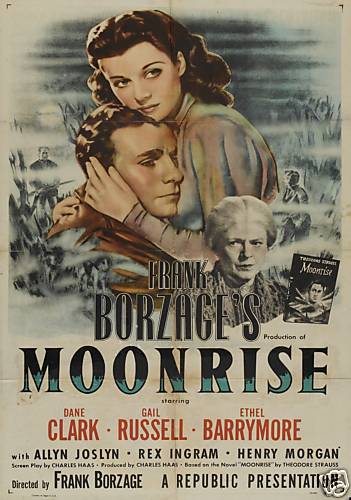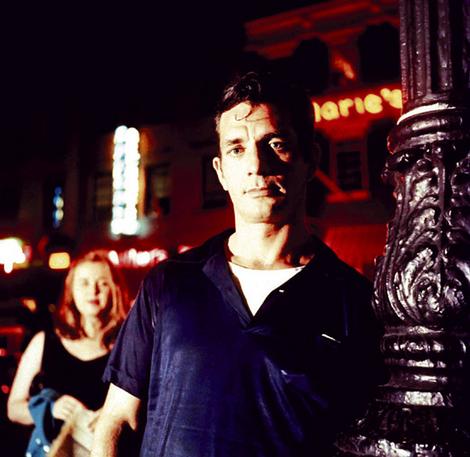Drunk late at night in 1955, Jack Kerouac watched Frank Borzage's Moonrise on TV, and wrote this poem about it, in his notebook of religious meditations eventually published as Some Of the Dharma:
DUMB POEM CALLED “MOONRISE”
A snake in a pond
Slithers out of harm
Seeking the frond
Of the heavenly farm.
Jeb was your Paw
Forevermore
And this is the law
Of love and gore.
The blood of the bear
Is soaking in the swamp,
Such heavenly air
Overhangs his pomp.
Give yourself up
To the sheriffs of truth,
Fear no hound pup
No karma of tooth
For your sweet smile
And meditations desperate
Are wine to the senile
And love to degenerate
Face the shroudy kitchen
Of the sea of the night
And make a pretty kitten
Of all this abounding blight
(Written after watching, drunk, Dane Clark on
TV in movie MOONRISE) —
Some cloth has that sin rip
This doesnt

My friend Paul Zahl (of The Zahl File) drew my attention to this. He writes:
This is Kerouac's little riff on a surprising movie, with its
Prophet of Grace Sheriff and its Recluse of Wisdom Rex Ingram, its
insight about dogs, and its unsensational, unforgettable scene on a
very small ferris wheel.
Prophet of Grace Sheriff and its Recluse of Wisdom Rex Ingram, its
insight about dogs, and its unsensational, unforgettable scene on a
very small ferris wheel.
I think I could preach three sermons arising from stanza four, and another two about the movie's not having “that sin rip”. I'm not sure they'd be received all that well — but maybe on a park bench some day, as in Moonrise.
drunk, manages to capture the theme of the film. Does “blood”-destiny have to determine the outcome of a life? Or can other
things, like love (the shaky and vulnerable heroine), a wise man for
father-figure (the Rex Ingram character “Mose”, who knows what's really
up before anyone else does, and who gives his hounds the dignity of
being called “Mr. Dog” and means it) . . .

drunk, manages to capture the theme of the film. Does “blood”-destiny have to determine the outcome of a life? Or can other
things, like love (the shaky and vulnerable heroine), a wise man for
father-figure (the Rex Ingram character “Mose”, who knows what's really
up before anyone else does, and who gives his hounds the dignity of
being called “Mr. Dog” and means it) . . .
. . . and a philosopher-sheriff, the
likes of whom I have never seen depicted in a movie — sort of a
small-town “zen-detective” (the phrase is Thornton Wilder's) — who is
able to convey a concrete quality of grace in unsentimental terms. Can
the “sin rip” (Kerouac's phrase, not the movie's) be mended? Mended in
believable terms, in a way that could actually happen?

Kerouac takes karma, and a dog's bite and faithfulness,
and the cabin kitchen at the end; and the swamp of the beginning and
middle; and comes up with a . . . kitten. All while drunk!
and the cabin kitchen at the end; and the swamp of the beginning and
middle; and comes up with a . . . kitten. All while drunk!
